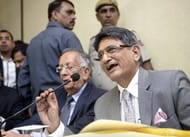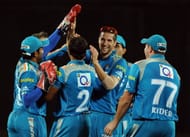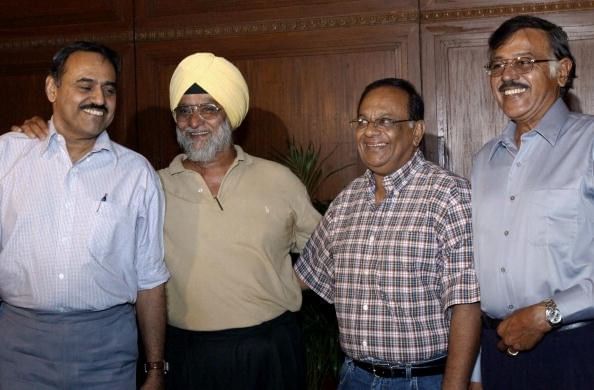A week ago, the Board of Control for Cricket in India (BCCI) set up a meeting of its Working Committee under the stewardship of new president Shashank Manohar. The agenda was clear and simple - cleaning up the messy state of affairs in the Indian Premier League, as directed by Justice RM Lodha's interim report, as well as revitalizing the domestic arena.
While some of the decisions taken were on expected lines, there are still quite a few question marks hovering over them. For the most ardent of cricket lovers, the steps announced by Indian cricket’s governing body felt like an anti-climax after promising much in terms of reforms.
Let's analyze the key outcomes of the meeting:
Decision 1: CSK & RR Suspended for 2 years
This was the obvious step because the other alternative was just too much for the Board. Both teams have been among the favourites in all eight seasons of the cash-rich Twenty20 tournament. While the latter is known for bringing lesser-known players such as Deepak Hooda into the spotlight, the former has made it to the penultimate stages of the IPL in every season since its inception in 2008.
Given the massive fan following that rival skippers MS Dhoni & Shane Watson have in this part of the world, it was always going to be a matter of suspension or termination. Banning both of these franchises outright would have crippled the television ratings for the summer extravaganza that the league has become in recent years. Loss of viewership means a direct impact on revenues - something that the mandarins at world cricket's richest governing body were keenly aware of, and wanted to prevent.
At the end of the day, the IPL is about entertainment, glitz and glamour, and of course, dollops of moolah. Why would you want to slay the goose that lays the golden egg?
Even so, if a crime is committed and the accused are proven guilty, they must be awarded a quantum of punishment equivalent to the seriousness of the action carried out by them. A termination of CSK and RR would actually have sent out a strong signal to the remaining franchises that corruption, chicanery, bribery and fixing of games for monetary gain are not to be tolerated.
You want to clean up the game - why not do it thoroughly? Why provide a solution that, in all fairness, doesn’t hold much water in the long term? And the verdict on IPL COO Sundar Raman was not disclosed; such loose ends do not bode well for the cricket board’s new leadership.
Left unsaid, however, is the matter of the players involved in these two tainted squads. What happens to folks like Hooda, James Faulkner, or any of the others? The BCCI might have tried to address this via Rajeev Shukla's statement that player interests would be taken care of, but where's the roadmap or plan to put this into action? At this moment, loose talk might not be the best tonic available.
These players are looking at two years in the wilderness, so why not revamp the domestic setup and groom them to be future international level players? Some of them hail from backgrounds that are economically limited and depend on that fat paycheck to ease some of their woes. How does the BCCI propose to safeguard these interests? It better be done soon, else valuable talents (at least for the Twenty20 format) will fade away into obscurity sooner rather than later.
Decision 2: Signing the "No Conflict of Interest" Declaration
Honestly, this was one of the decisions that made me laugh. The Board has asked its office bearers (state association representatives, selection committees etc.) to sign a declaration stipulating that they would not enter into agreements that would result in a conflict of interest in cricketing matters. Latest reports suggest that at least four of the state associations haven't signed it yet as they have sought more clarification on certain aspects.
Here's the funny part: Why do you want to bring in a declaration when you can simply amend Clause 6.2.4 of the BCCI Constitution, which originally stated:
"No administrator could have, directly or indirectly, any commercial interest in the matches or events conducted by the board"?
This was later modified to exclude the IPL, the Champions League and Twenty20 under directions from former BCCI strongman & head honcho N Srinivasan. Many, including former president AC Muthiah, strongly objected to the CSK owner's blatant disregard for following the rules set down on paper and which were legally binding upon all who were involved in some capacity with the cricketing body.
After Justice Lodha's team delivered its scathing response earlier this year, it presented a golden opportunity to Manohar (known as Mr. Clean) to put a stop to all this kerfuffle by again re-wording the relevant clause to its original statement.
Instead, he and his team come up with yet another legal document - a declaration, of all things. In a country where even government circulars are sometimes torn off and dumped in the trash, how does the average cricket fan expect to take this decision seriously? Extremely humorous, though not entirely.
My suggestion would be to restore Clause 6.2.4 in its original form. Some semblance of order is required if you are really serious about bringing in large-scale changes.
Decision 3: Inviting Two New Teams For the Next Two Seasons of the IPL
The experiment with Sahara's Pune Warriors and Kochi Tuskers Kerala did not go down too well - both franchises were eventually terminated by the BCCI. With the Chennai and Rajasthan teams out of contention for IPL glory in 2016 and 2017, the BCCI's decision to float tenders for two new teams made a lot of sense - it does not want the IPL to have more than eight franchises.
Watching the games involving the existing squads is already a herculean task; having two more franchises in the fray will require even more patience from the average viewer and might just be an overdose of entertainment, to be frank.
However, the question remains as to what would become of these franchises after the suspended ones finish serving their 'exile'. Would they be allowed to continue, making it a ten-team affair, something the BCCI is clearly reluctant to do? If the new teams pick up the players displaced from Chennai and Rajasthan, have them on their roster for two years, and then be asked to release them back to their older squads, what would they be left with?
I would suggest having fresh auctions for all the teams - including the new entrants - so that players get a chance to showcase their talents once again. While this will solve the immediate problem of those in the suspended franchises, it will also give the BCCI added incentive to start over and rebuild the IPL's image.
Decision 4: Revitalizing the National Cricket Academy (NCA) as a Centre of Excellence
If the revamping is taken seriously by members of the Board as well as the state associations, then the NCA may soon surpass even the likes of the Australian Centre for Excellence in Brisbane. Given the current issues plaguing the Indian national team across all three formats of the game, it is highly imperative that the Bangalore-based training unit is revived posthaste.
With a focus on all-round development, the BCCI should bring in stalwarts like Dilip Vengsarkar, Rahul Dravid, VVS Laxman and a host of other former players (the famed spin quartet is desperately needed) to mould budding cricketers into world-beating professionals.
As things stand, the lure of fame, glory and lots of dough is enough to turn anyone' s head to the exciting but thankless world of the IPL If the ultimate aim of a youngster is to turn out for his or her nation at the highest level (Test cricket), the basics must be refined at home, and what better home than the NCA to hone your skills at?
As part of the rebuilding phase of the NCA, the BCCI must recommend that every intake of students should ply their trade on the English county circuit, as well as play in South Africa, Australia and the West Indies, to acclimatise to changing conditions & tracks. The Board has also roped in the MRF Pace Foundation (under Australian legend Glenn McGrath) to train fast bowlers across the country; why doesn't it bring in our champion spinners to revive the mystique of tweak as well?
India's shortcoming against spin was glaringly exposed by Sri Lanka in the recently concluded Test series, so it becomes even more crucial for Manohar and Co. to initiate rectification measures as soon as possible.
Brand-new app in a brand-new avatar! Download CricRocket for fast cricket scores, rocket flicks, super notifications and much more! 🚀☄️




